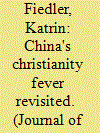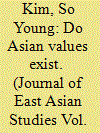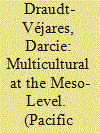|
|
|
Sort Order |
|
|
|
Items / Page
|
|
|
|
|
|
|
| Srl | Item |
| 1 |
ID:
102448


|
|
|
|
|
| Publication |
2010.
|
| Summary/Abstract |
Chinese Protestant Christianity has been continually growing over the past three decades, with an estimated one million converts per year. A number of studies have sought to explain this phenomenon. This paper critically reviews existing studies of China's "Christianity Fever" and then outlines the role of the community as one crucial factor in the conversion process. With its emphasis on communality, as a central element of both Christian theology and the fellowship activities that are part of Christian practice, Protestant Christianity fills a gap opened up by the change in traditional familial and social structures. By discussing specific aspects relating to the communal nature of Christianity, such as familism, elitism, and dynamics at work in face-to-face evangelism, this paper offers an alternative reading of existing studies.
|
|
|
|
|
|
|
|
|
|
|
|
|
|
|
|
| 2 |
ID:
174408


|
|
|
|
|
| Summary/Abstract |
As market reforms and socioeconomic development have transformed the Chinese economy, family life in rural and urban areas has also been directly and indirectly altered. Yet demographers who observe the rise of singlehood and sub-replacement fertility find confirmation of the universal application of theories in support of the Second Demographic Transition (SDT), while others find that high rates of marriage, near absence of births outside of marriage, and continuing centrality of inter-generational aid flows call for a more nuanced approach in China. In response to the still limited research on this rising diversity of contemporary family life in China, this special issue provides both theoretical insights and empirical evidence to examine how individualistic and familial values coexist, clash, and interact in different aspects of family life, and how gender relations and intergenerational politics have evolved at the same time.
|
|
|
|
|
|
|
|
|
|
|
|
|
|
|
|
| 3 |
ID:
096600


|
|
|
|
|
| Publication |
2010.
|
| Summary/Abstract |
The Asian values debate has been long on speculative advocacy but short on empirical validation, with statistical tests emerging only lately. This study explores two questions: whether Asians indeed hold distinct cultural attitudes when compared with non-Asians and whether these cultural attitudes and beliefs identified as Asian values form coherent dimensions among Asians. The study first identifies four dimensions of Asian values based on a review of various Asian values discourses: familism, communalism, authority orientations, and work ethic. The findings from the empirical analysis based on multilevel models and factor analysis return mixed support for the Asian values hypothesis. Although East Asian respondents do exhibit strong work-related values compared with those from other regions, commitment to familial values and authoritarian orientations are actually lower among East Asians. Also, while preference for strong leadership and parental duty do turn out to form distinct sets of attitudes among South and Southeast Asians, the four dimensions do not constitute a clear value complex in the minds of East Asians.
|
|
|
|
|
|
|
|
|
|
|
|
|
|
|
|
| 4 |
ID:
193635


|
|
|
|
|
| Summary/Abstract |
Departing from extant studies that largely focus on gender roles, norm diffusion, or ethnonationalism, this paper highlights policy siting as one understudied factor in determining why and when states manage cultural diversity. Using the case of South Korea’s family-centred multicultural policy, the paper contributes to the growing body of literature on comparative policymaking, multiculturalism, and multi-level citizenship by foregrounding the processes by which governing elites target specific meso-level social institutions as privileged sites of diversity governance. The paper draws on immersive field research conducted between 2017 and 2023 to introduce and analyze the concept of familial multiculturalism to explain how the state locates diversity governance mainly within the family and between family and broader society. Siting diversity governance in powerful meso-level institutions like the nuclear family in shaping state multiculturalism is not unique to Korea. Rather, the paper contends that these institutions play a significant role in cultural management endeavours worldwide. While the content of a multicultural site depends on history and national context, states worldwide seek to mitigate social friction and political backlash by targeting certain intercultural relations and negating or delegitimizing others. The paper concludes with a discussion of the contemporary political ramifications of Korea’s multiculturalism and prospects for future broadening and deepening.
|
|
|
|
|
|
|
|
|
|
|
|
|
|
|
|
| 5 |
ID:
178755


|
|
|
|
|
| Summary/Abstract |
This article explores the “ethical labour” of suspension––the conscious effort of deferring one’s ethical judgement and reflections in order to avoid irreconcilable ethical conflicts between one’s present activities and long-term goals. While people engage in ethical judgement and reflections in everyday social interactions, it is the laborious aspect of regulating one’s ethical dispositions that I highlight in the concept of “ethical labour.” Although it cannot be directly commodified, ethical labour is a form of labour as it consumes energy and is integral to the performance of other forms of labour, particularly intimate and emotional ones. This formulation of ethical labour draws on my long-term ethnographic research with a group of young women migrants working as hostesses in high-end nightclubs in southeast China. Many of them perform socially stigmatized work with the goal of contributing to their family and saving money for a dignified life in the future. Ethical labour is essential to their hostess work because it enables them to juggle multiple affective relationships and defer the fundamental ethical conflict. They express ethical labour through the phrase “to be a little more realistic,” making sure that they obtain what they want at a particular moment. But ethical labour does not simply mean pushing ethical questions aside. It is sustained by conscious effort and is overshadowed by fears of ageing and failure to achieve long-term life goals. Prolonged ethical labour often fails to resolve ethical conflict and may intensify one’s stress. My analysis of these women migrants’ situation contributes to the sex-as-work debate regarding women’s agency in work and their subjection to exploitation.
|
|
|
|
|
|
|
|
|
|
|
|
|
|
|
|
|
|
|
|
|